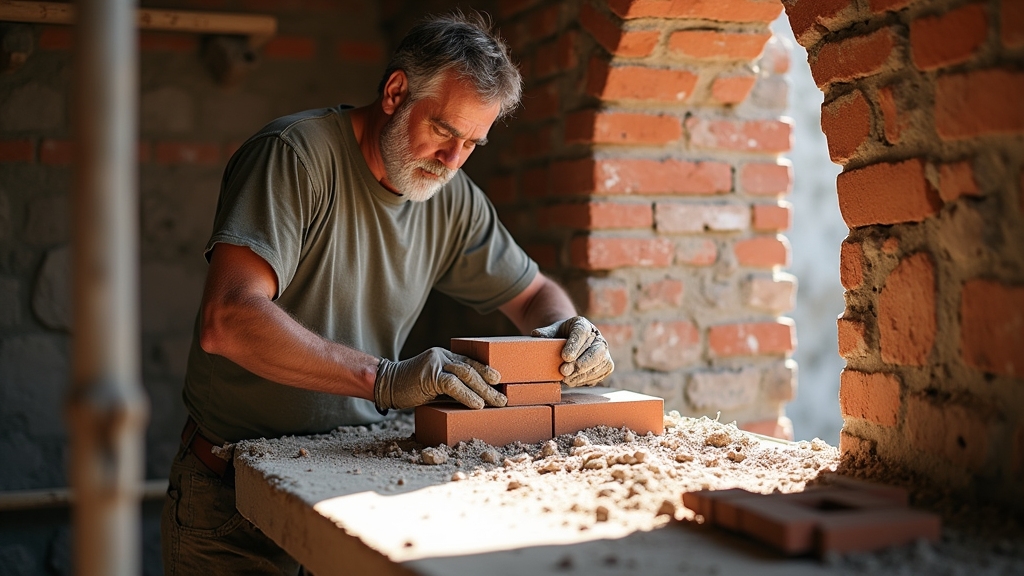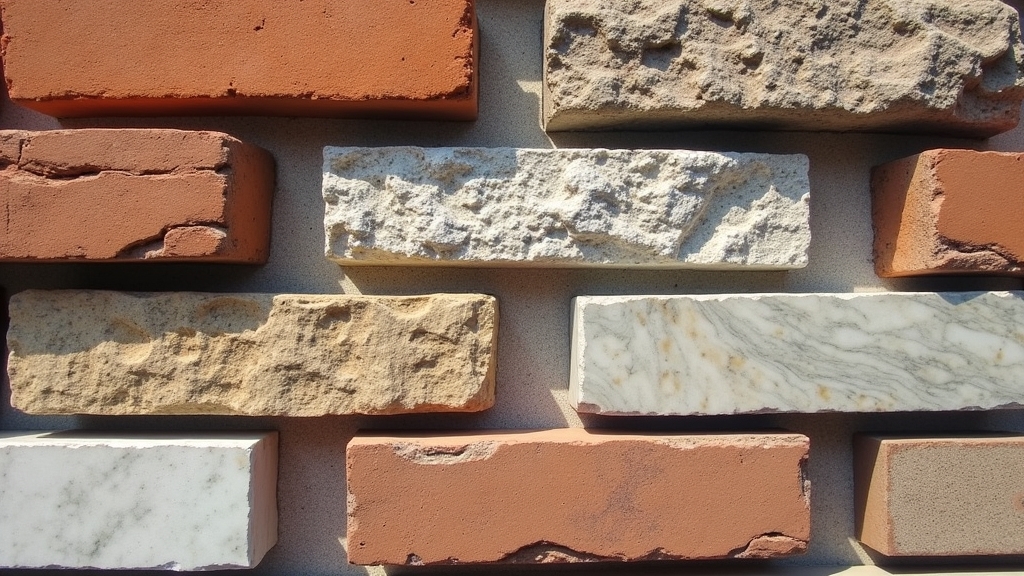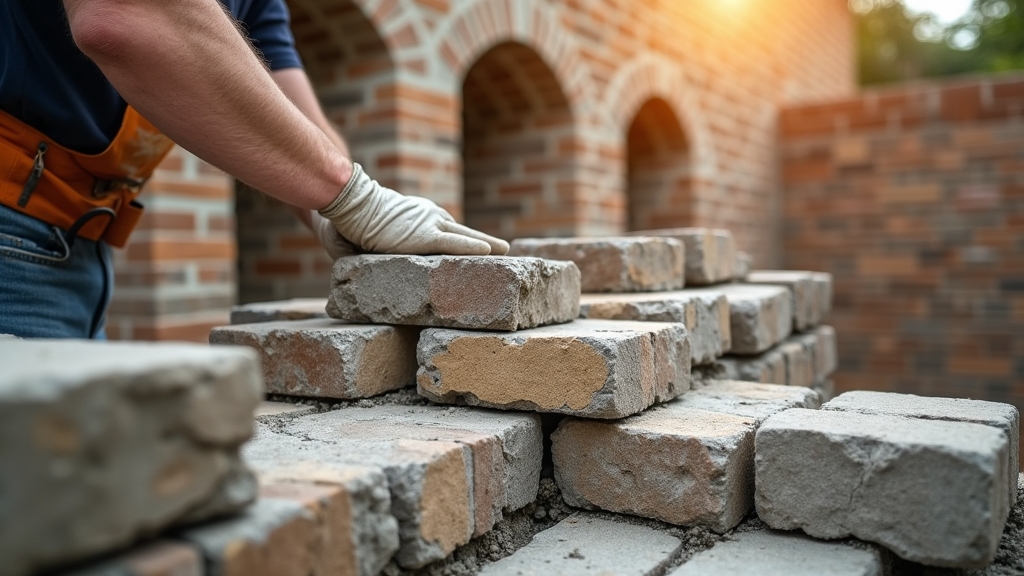Masonry combines materials like brick, stone, and concrete to create durable structures that enhance your property’s value and longevity. It’s essential for ensuring stability, low maintenance, and even energy efficiency. Proper masonry techniques and materials contribute to structural integrity while improving aesthetic appeal. Additionally, well-maintained masonry can increase your property’s market competitiveness, offering better resale value. Discover more about how masonry can elevate your property and its importance in construction.
Key Takeaways
- Masonry involves constructing structures using materials like brick, stone, and concrete, ensuring durability and stability in building design.
- It offers low maintenance requirements, making masonry structures cost-effective and long-lasting for property owners.
- Masonry enhances energy efficiency and provides excellent fire resistance, contributing to safety and sustainability in construction.
- Aesthetic versatility in masonry allows for various design options, improving the visual appeal and market attractiveness of properties.
- Well-crafted masonry can increase property value, leading to higher appraisal rates and quicker sales in the real estate market.
The Basics of Masonry: An Overview

When considering the construction of durable structures, understanding the basics of masonry is vital.
Masonry, with roots tracing back to ancient civilizations, has evolved through a rich masonry history that informs modern practices. This craft primarily involves assembling materials like brick, stone, or concrete into a sturdy framework.
Mastery of masonry techniques is essential; techniques such as bond patterns, mortar application, and load distribution greatly impact a structure’s stability and longevity. You’ll find that precision in measurement and alignment directly affects the integrity of your work.
Mastering masonry techniques, from bond patterns to mortar application, is crucial for ensuring structural stability and longevity.
Additionally, knowledge of climate considerations and material properties guarantees peak performance. By grasping these fundamentals, you’re laying the groundwork for successful masonry projects that can withstand the test of time.
Types of Masonry Materials

When considering masonry for your property, you’ll encounter various materials, each with distinct characteristics.
Brick masonry options offer durability and aesthetic appeal, while stone masonry provides a natural, timeless look.
Additionally, concrete blocks serve as versatile, cost-effective solutions for a range of construction needs.
Brick Masonry Options
There are several brick masonry options available that cater to various aesthetic and structural needs.
When considering brick selection, you’ll find options such as fired clay bricks, which offer durability and a classic appearance, and concrete bricks, known for their strength and versatility.
Additionally, you can explore different finishes and colors to enhance brick aesthetics, creating a unique look that complements your property.
For instance, glazed bricks provide a shiny finish while natural stones can be integrated for a rustic appeal.
Each type serves specific purposes, whether for load-bearing walls or decorative facades.
Understanding these options allows you to make informed decisions that align with both your aesthetic vision and structural requirements.
Stone Masonry Variety
While exploring stone masonry options, you’ll discover a diverse range of materials that can enhance both the aesthetic and structural integrity of your property.
Understanding various stone types and masonry styles is essential for making informed decisions. Here are some prominent options to reflect upon:
- Granite: Known for its durability and resistance to weathering.
- Limestone: Offers a softer, more natural appearance, ideal for intricate designs.
- Slate: Perfect for roofing and flooring due to its natural slip resistance.
- Marble: Valued for its elegance and beauty, often used in decorative features.
- Basalt: A volcanic rock known for its strength and unique textures.
Concrete Block Uses
After considering the variety of stone masonry options, it’s important to recognize concrete blocks as a versatile and widely used material in construction. These blocks offer numerous concrete block advantages, such as durability, fire resistance, and energy efficiency. Their applications range from structural walls to landscaping features, making them invaluable in various projects.
| Application | Advantage | Description |
| Structural Walls | High Strength | Supports heavy loads efficiently |
| Retaining Walls | Erosion Control | Prevents soil erosion effectively |
| Sound Barriers | Noise Reduction | Minimizes sound transmission |
| Decorative Features | Aesthetic Versatility | Can be customized for visual appeal |
| Insulation Walls | Energy Efficiency | Reduces energy costs in buildings |
Embracing concrete blocks can elevate your construction projects remarkably.
Benefits of Masonry in Construction

Masonry offers a robust and versatile solution for construction, making it a preferred choice for many builders.
Its numerous benefits include:
- Durability: Masonry structures withstand harsh weather and require minimal maintenance.
- Sustainability Benefits: Masonry materials, like brick and stone, often have low environmental impact and high energy efficiency.
- Aesthetic Appeal: The variety of textures and colors available enhances the visual appeal of buildings.
- Fire Resistance: Masonry provides excellent fire resistance, adding an extra layer of safety to your property.
- Acoustic Performance: Masonry effectively dampens sound, creating a quieter environment.
Common Masonry Techniques
Incorporating masonry into your construction project involves understanding various techniques that enhance its structural integrity and aesthetic value. Mastering these masonry techniques can greatly impact your masonry applications, whether for walls, walkways, or decorative elements.
| Technique | Description |
| Bricklaying | Arranging bricks in patterns for strength and design. |
| Stone Masonry | Using natural stones for durability and visual appeal. |
| Concrete Block | Employing concrete blocks for cost-effective and versatile construction. |
Maintaining Your Masonry Structures
To guarantee the longevity of your masonry structures, regular inspections are essential.
You’ll need to be aware of effective repair techniques and implement weatherproofing strategies to protect against the elements.
Regular Inspections Needed
While many property owners may overlook the importance of regular inspections, maintaining your masonry structures is essential for ensuring their longevity and structural integrity.
A routine masonry inspection enhances durability and helps identify potential issues early. Here are some key benefits of regular maintenance:
- Detecting cracks and moisture infiltration
- Preventing costly repairs and extensive damage
- Ensuring structural stability and safety
- Enhancing aesthetic appeal and property value
- Extending the lifespan of masonry materials
Understanding masonry inspection importance fosters proactive care.
By committing to regular inspections, you can reap significant maintenance benefits and safeguard your property’s investment.
Prioritize these assessments to maintain a resilient and enduring masonry structure.
Repair Techniques Overview
After conducting regular inspections, addressing any identified issues promptly is essential for maintaining the integrity of your masonry structures.
Effective masonry repair begins with identifying specific problems, such as cracks, spalling, or loose joints. Utilize restoration techniques like repointing to restore mortar joints, guaranteeing a tight seal against moisture intrusion.
For larger issues, consider replacing damaged bricks or stones, which requires careful matching to maintain aesthetic consistency. Injection of epoxy or polyurethane can effectively seal cracks, enhancing structural stability.
Always use high-quality materials to guarantee longevity and durability.
Finally, regular maintenance, including cleaning and sealing surfaces, can mitigate future damage. Master these techniques to preserve your masonry’s beauty and functionality.
Weatherproofing Strategies Explained
Since weather can greatly impact the durability of masonry structures, implementing effective weatherproofing strategies is essential for their long-term maintenance.
To protect your masonry from moisture and environmental damage, consider the following strategies:
- Select appropriate weatherproofing materials to suit your specific masonry type.
- Install moisture barriers to prevent water infiltration and mitigate damage.
- Apply sealants regularly to enhance surface protection against rain and humidity.
- Maintain proper drainage around your masonry to direct water away from the structure.
- Inspect and repair joints and cracks promptly to prevent moisture penetration.
Enhancing Property Value With Masonry
Masonry greatly boosts your property’s value through its durability and aesthetic appeal. High-quality masonry structures withstand the test of time, reducing maintenance costs and enhancing longevity, which positively influences property appraisal.
When potential buyers see a well-crafted masonry façade, they perceive higher value and are often willing to pay a premium, leading to significant investment returns. Additionally, masonry offers versatile design options that can complement any architectural style, making your property more attractive in a competitive market.
Frequently Asked Questions
How Long Does Masonry Last Compared to Other Construction Methods?
Masonry lifespan often exceeds other construction methods, typically lasting 50 to 100 years. Its construction durability stems from materials like brick and stone, which withstand weathering, pests, and fire, ensuring long-term stability and performance.
Can Masonry Be Repaired Without Replacing Entire Sections?
Yes, you can repair masonry without replacing entire sections. By employing specific masonry techniques and repair methods, you’ll effectively address issues like cracks or joints, ensuring the structure’s integrity while preserving its original design.
What Is the Cost Difference Between Masonry and Wood Construction?
Masonry construction generally costs more upfront due to materials and labor, but its advantages—durability and low maintenance—outweigh wood’s disadvantages, like susceptibility to rot and pests, making it a worthy investment for long-term value.
Are There Environmental Impacts Associated With Masonry Production?
Yes, masonry production does have environmental impacts. It typically requires high energy consumption and may not utilize sustainable materials. Choosing alternatives can mitigate these impacts, allowing for more eco-friendly construction practices that benefit both you and the environment.
How Does Weather Affect Masonry Durability Over Time?
Weather considerably affects masonry durability; moisture damage can arise from freeze-thaw cycles. When water infiltrates masonry, it expands upon freezing, leading to cracks and deterioration. Regular maintenance helps mitigate these effects and prolongs lifespan.
Final Thoughts
Masonry is more than just a construction method—it’s the foundation of long-lasting beauty, strength, and value for your property. By choosing the right materials and techniques, you can create structures that stand the test of time, require minimal upkeep, and enhance your home’s curb appeal. Beyond durability, quality masonry contributes to energy efficiency, safety, and long-term property value—making it one of the smartest investments a homeowner can make.
If you’re ready to elevate your property with expert craftsmanship, trust Premiere Masonry Rochester Hills. Our skilled team specializes in masonry restoration, tuckpointing, porch repair and rebuilding, and more—delivering lasting quality and timeless appeal.
Take the next step toward strengthening and beautifying your home. Explore our services or contact us today for a free consultation. Let Premiere Masonry Rochester Hills help you protect and enhance your property with precision and care.

